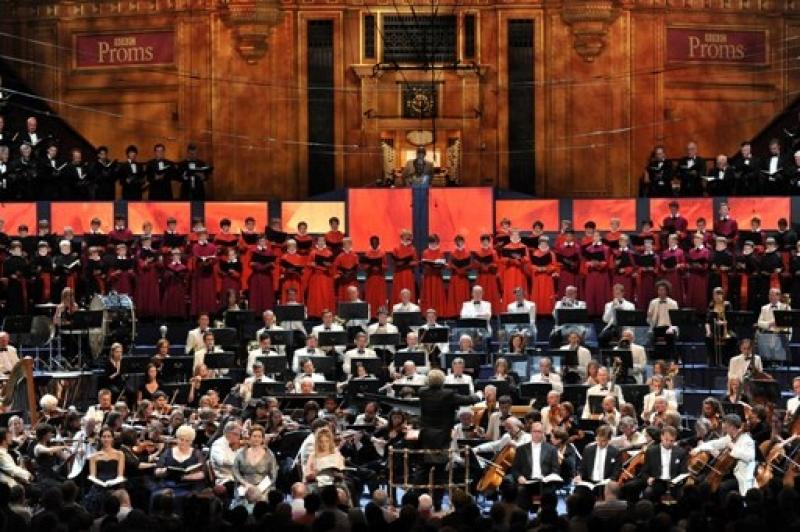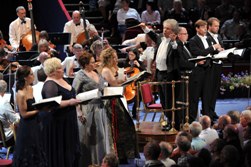First Night of the 2010 Proms | reviews, news & interviews
First Night of the 2010 Proms
First Night of the 2010 Proms
Choirs and orchestra blaze, but the opening-night epic is let down by its soloists

Numerologists may have been fretting over whether Proms forces could match the apocryphal thousand of the mightiest Eighth Symphony's 1910 world premiere, which Mahler feared would turn into a "catastrophic Barnum and Bailey show". With nothing like 350 in the children's chorus, for a start, not a chance.
In Mahler's headlong Part One, a burning and more or less unanimous hymn to the creator spirit, you fret only briefly when a voice in the ensemble gets out of true and one of the two sopranos can't really cap the line. And from where I was sitting (centre back in the semicircle of stalls, when I should have been standing - and will be, on less packed evenings - down in the arena) that was a handicap. Anyone remember the luminous giant voice of Alessandra Marc, once indispensible in this symphony? That, or Christine Brewer's, is the sort of sound you need back there, and only mezzo Stephanie Blythe (pictured second from the left below) really had it. Let;'s face it, Mahler as one of the greatest opera conductors of his time was writing unashamedly for divas (and divos) here. And Colorado-born Mardi Byers didn't have what it took. If she'd been better, I might not have been troubled by irrelevant thoughts like, if only they'd found an African American soprano - and I could think of two who've been terrific Aidas - the wider world to whom the BBC Two broadcast presumably reached out might have thought our First Night a little more all-inclusive.
 Part Two, where the chain of voices from the depths to the heights needs to lead us upwards to Mahler's - and his inspiration, Goethe's - image of the Eternal Feminine, brought another random thought: why no Brits in the solo line-up? Wouldn't Bryn Terfel and Brindley Sherratt from tomorrow's Meistersinger have done a much better job than Hanno Müller-Brachmann and Tomasz Konieczny? Here it wasn't a question of volume and amplitude, for the German baritone and the Polish bass both came across loud and clear, only of struggles with Mahler's awkward upper ranges. Expressive pointing of the text, which Müller-Brachmann certainly managed along with a handsome mid-register, was one thing; but hitting the heights is equally important. Last-minute replacement heldentenor Stefan Vinke could, with a bit of effort, but it was never a rich or lovely sound. Important? Yes, because in Blythe's brief solo, everything came together and for a moment I was on the edge of my seat witnessing a moment of pure, urgent communication. None of the three soloists I haven't mentioned, though acceptable, was on the same level, and it showed.
Part Two, where the chain of voices from the depths to the heights needs to lead us upwards to Mahler's - and his inspiration, Goethe's - image of the Eternal Feminine, brought another random thought: why no Brits in the solo line-up? Wouldn't Bryn Terfel and Brindley Sherratt from tomorrow's Meistersinger have done a much better job than Hanno Müller-Brachmann and Tomasz Konieczny? Here it wasn't a question of volume and amplitude, for the German baritone and the Polish bass both came across loud and clear, only of struggles with Mahler's awkward upper ranges. Expressive pointing of the text, which Müller-Brachmann certainly managed along with a handsome mid-register, was one thing; but hitting the heights is equally important. Last-minute replacement heldentenor Stefan Vinke could, with a bit of effort, but it was never a rich or lovely sound. Important? Yes, because in Blythe's brief solo, everything came together and for a moment I was on the edge of my seat witnessing a moment of pure, urgent communication. None of the three soloists I haven't mentioned, though acceptable, was on the same level, and it showed.
There were, thankfully, a few more of those eternal moments from choirs and orchestra. Bringing together BBC Symphony, Crouch End and Sydney choirs as well as choristers from St Paul's, Westminster Abbey and Westminster Cathedral might not have been a guarantee of anything more than a big sound; but they all found the right fervour in their full-throttle unisons, for once truly antiphonal in this arena, and luminous delicacy to Mahler's more relaxed moments of quiet play. From the BBC Symphony Orchestra, too, the hushed moments were the best, as so often in the Albert Hall vasts. Bĕlohlávek knows by now how to get his players to project solo lines into the space. Naughty atoms in the first movement's twilight zones ricocheted around the hall; as Mahler leaves the orchestra to imagine Goethe's romantic landscape of trees and crags at the beginning of Part Two, horn choir, shrill piccolo and plangent oboe conjured spirits from the vasty deep. And audiences have to learn to forgive the split trumpet notes if the basic intention is good, though the treble brass sounded over-fierce from my coign of vantage.
Did Bĕlohlávek have the measure of Mahler's biggest, most operatic symphonic act? In recent Barbican seasons, he's managed superbly with near-comparable long hauls in the Third and Ninth Symphonies; here, it felt somehow less organic. The solo voices as trustees of the narrative certainly didn't help, but between a rapt approach to the very Viennese soaring of Goethe's Mater Gloriosa and the radiant thunder of the epilogue, I felt a certain loss of tension and direction. No doubt about it, though: this is the place to hear massed forces at their best celebrate the Faustian apotheosis. As celestial brass added their voices to the final fervour, all disappointments were left behind. And then, I'm afraid, they all came flooding back again. Not the greatest of Mahler Eights by any means, but it's still the best possible way to launch the Proms in the composer's big birthday year.
- Read theartsdesk's recommendations for the 2010 BBC Proms
- Next instalment in Bĕlohlávek's Mahler series with the BBCSO is the Sixth Symphony at the Barbican on 2 February 2011
- Listen to the Radio 3 broadcast of this concert on the BBC iPlayer for the next week
Add comment
The future of Arts Journalism
You can stop theartsdesk.com closing!
We urgently need financing to survive. Our fundraising drive has thus far raised £49,000 but we need to reach £100,000 or we will be forced to close. Please contribute here: https://gofund.me/c3f6033d
And if you can forward this information to anyone who might assist, we’d be grateful.

Subscribe to theartsdesk.com
Thank you for continuing to read our work on theartsdesk.com. For unlimited access to every article in its entirety, including our archive of more than 15,000 pieces, we're asking for £5 per month or £40 per year. We feel it's a very good deal, and hope you do too.
To take a subscription now simply click here.
And if you're looking for that extra gift for a friend or family member, why not treat them to a theartsdesk.com gift subscription?
more Classical music
 Hallé John Adams festival, Bridgewater Hall / RNCM, Manchester review - standing ovations for today's music
From 1980 to 2025 with the West Coast’s pied piper and his eager following
Hallé John Adams festival, Bridgewater Hall / RNCM, Manchester review - standing ovations for today's music
From 1980 to 2025 with the West Coast’s pied piper and his eager following
 Kaploukhii, Greenwich Chamber Orchestra, Cutts, St James's Piccadilly review - promising young pianist
A robust and assertive Beethoven concerto suggests a player to follow
Kaploukhii, Greenwich Chamber Orchestra, Cutts, St James's Piccadilly review - promising young pianist
A robust and assertive Beethoven concerto suggests a player to follow
 Robin Holloway: Music's Odyssey review - lessons in composition
Broad and idiosyncratic survey of classical music is insightful but slightly indigestible
Robin Holloway: Music's Odyssey review - lessons in composition
Broad and idiosyncratic survey of classical music is insightful but slightly indigestible
 Classical CDs: Wolf-pelts, clowns and social realism
British ballet scores, 19th century cello works and contemporary piano etudes
Classical CDs: Wolf-pelts, clowns and social realism
British ballet scores, 19th century cello works and contemporary piano etudes
 Bizet in 150th anniversary year: rich and rare French offerings from Palazzetto Bru Zane
Specialists in French romantic music unveil a treasure trove both live and on disc
Bizet in 150th anniversary year: rich and rare French offerings from Palazzetto Bru Zane
Specialists in French romantic music unveil a treasure trove both live and on disc
 Scottish Chamber Orchestra, Ibragimova, Queen’s Hall, Edinburgh review - rarities, novelties and drumrolls
A pity the SCO didn't pick a better showcase for a shining guest artist
Scottish Chamber Orchestra, Ibragimova, Queen’s Hall, Edinburgh review - rarities, novelties and drumrolls
A pity the SCO didn't pick a better showcase for a shining guest artist
 Kilsby, Parkes, Sinfonia of London, Wilson, Barbican review - string things zing and sing in expert hands
British masterpieces for strings plus other-worldly tenor and horn - and a muscular rarity
Kilsby, Parkes, Sinfonia of London, Wilson, Barbican review - string things zing and sing in expert hands
British masterpieces for strings plus other-worldly tenor and horn - and a muscular rarity
 From Historical to Hip-Hop, Classically Black Music Festival, Kings Place review - a cluster of impressive stars for the future
From quasi-Mozartian elegance to the gritty humour of a kitchen inspection
From Historical to Hip-Hop, Classically Black Music Festival, Kings Place review - a cluster of impressive stars for the future
From quasi-Mozartian elegance to the gritty humour of a kitchen inspection
 Shibe, LSO, Adès, Barbican review - gaudy and glorious new music alongside serene Sibelius
Adès’s passion makes persuasive case for the music he loves, both new and old
Shibe, LSO, Adès, Barbican review - gaudy and glorious new music alongside serene Sibelius
Adès’s passion makes persuasive case for the music he loves, both new and old
 Anja Mittermüller, Richard Fu, Wigmore Hall review - a glorious hall debut
The Austrian mezzo shines - at the age of 22
Anja Mittermüller, Richard Fu, Wigmore Hall review - a glorious hall debut
The Austrian mezzo shines - at the age of 22
 First Person: clarinettist Oliver Pashley on the new horizons of The Hermes Experiment's latest album
Compositions by members of this unusual quartet feature for the first time
First Person: clarinettist Oliver Pashley on the new horizons of The Hermes Experiment's latest album
Compositions by members of this unusual quartet feature for the first time

Comments
...
...
...
...